Bernard Herrmann Radio Documentary
Introduction:
Like Bruce Crawford, I was introduced to Bernard Herrmann's music at an early age. My first experience was his milestone score for one of the greatest sci-films, THE DAY THE EARTH STOOD STILL (1951), which was the first time I noticed how important a film score could be to enhance the story of a film.
Much later, when I became a college teacher, I played several of his film scores in class and always received appreciative comments from the students.
Then, as a film music critic, I reviewed many of his film scores on CDs.
In 2011, for the centennial year of Herrmann's birth, together with our other critics, Steven A. Kennedy and Steve Vertlieb, we presented our favorite Herrmann film scores.
I remember hearing the radio documentary described below on Ron Della Chiesa's radio program in Boston, shortly after I had presented my own radio tribute on Herrmann's film music on Ron's program.
So it is with great pleasure that I present the following extensive article by
Steve Vertlieb, about the superb radio documentary.
--Roger Hall, Managing Editor, Film Music Review
Note: The article by Steve Vertlieb has been reprinted on File 770 fan site
without
any permission to reprint it. The reprint is in violation of copyright
protection. It was originated posted in 2014 as shown here...
BERNARD HERRMANN: A CELEBRATION OF HIS LIFE AND MUSIC
In 1988, producers Bruce Crawford and Bob Coate set about creating a definitive radio documentary honoring the life and career of one of the cinema’s most revered motion picture composers, Bernard Herrmann. The broadcast, which aired over KIOS FM Radio in 1988, has become a lasting recorded tribute to a beloved figure whose legend and persona have often over shadowed his enormous musical legacy.
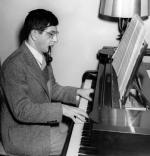
Bernard Herrmann was a colorful, flamboyant, larger than life musician whose incalculable contributions to the art of film music helped to elevate the genre to an authentic art form. While Herrmann’s public ambitions aspired to little more than conducting the works of his personal musical influences and heroes, his own unique and sensitive scoring would form the basis for much of the most influential and original film music of the twentieth century. Bernard Herrmann, along with friend and fellow screen composer Miklos Rozsa, was at the forefront of musicians attempting to bring classical music sensibilities and importance to the sound of films. Neither Herrmann nor Rozsa recognized any difference between the integrity of music written for the screen and music composed for the concert stage. They reasoned that there were only two kinds of serious music…either good or bad, and that legitimate symphonic music had as much a significant place in the world of film, as it did upon the concert stage. His legacy is, indeed, a testament to the beauty and power of original music created for the screen. Herrmann’s legendary collaborations with Alfred Hitchcock, Orson Welles, Ray Harryhausen, Francois Truffaut, and Brian De Palma, alone, represent some of the most strikingly original, breathtaking dramatic music of the last century. One has simply to listen to the exquisite, achingly beautiful romanticism of VERTIGO, THE GHOST AND MRS. MUIR, FAHRENHEIT 451, and "Walking Distance" (the most poetic, uniquely haunting episode of THE TWILIGHT ZONE) in order to appreciate the sublime artistry of this masterful composer.
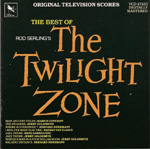 In creating a biographical essay for radio, producers Crawford and Coate were faced with the daunting task of capturing the enormity of Herrmann’s career in merely a few hours. To tell the story of this legendary composer, the pair set about interviewing surviving composers, film makers, associates, friends and family members able to recall and recount both provocative and affectionate remembrances of a quite remarkable career. Among the more fascinating recollections recorded for the stunning radio documentary were those related by writer, and former Herrmann spouse, Lucille Fletcher who penned the fondly remembered suspense classic, THE HITCHHIKER. First dramatized on radio on September 2nd, 1942, and narrated by Orson Welles for Suspense Theater, the eerie original drama related the story of a man traveling cross country when his car is involved in a near fatal highway accident. Relieved to have survived the crash, the narrator continues his troubled journey across the country with the unnerving realization that the strange hitchhiker punctuating the highway at periodic intervals along his travels is an innocuous seeming personification of death…a determined grim reaper awaiting his every turn and stop. The traveler begins to realize that he never actually survived the earlier calamitous automobile crash, and that the angel of death was beckoning him home. Scripted by Fletcher, and scored by Herrmann, THE HITCHHIKER was inspired by an actual incident in which Herrmann and Fletcher drove along seemingly endless miles of highway, confined by monotony, in a 1940 Packard. Some seventeen years later, Rod Serling adapted the story for the first season of THE TWILIGHT ZONE, changing the protagonist to a frightened woman played by Inger Stevens. Bernard Herrmann once again scored the frightening television adaptation of the classic story.
In creating a biographical essay for radio, producers Crawford and Coate were faced with the daunting task of capturing the enormity of Herrmann’s career in merely a few hours. To tell the story of this legendary composer, the pair set about interviewing surviving composers, film makers, associates, friends and family members able to recall and recount both provocative and affectionate remembrances of a quite remarkable career. Among the more fascinating recollections recorded for the stunning radio documentary were those related by writer, and former Herrmann spouse, Lucille Fletcher who penned the fondly remembered suspense classic, THE HITCHHIKER. First dramatized on radio on September 2nd, 1942, and narrated by Orson Welles for Suspense Theater, the eerie original drama related the story of a man traveling cross country when his car is involved in a near fatal highway accident. Relieved to have survived the crash, the narrator continues his troubled journey across the country with the unnerving realization that the strange hitchhiker punctuating the highway at periodic intervals along his travels is an innocuous seeming personification of death…a determined grim reaper awaiting his every turn and stop. The traveler begins to realize that he never actually survived the earlier calamitous automobile crash, and that the angel of death was beckoning him home. Scripted by Fletcher, and scored by Herrmann, THE HITCHHIKER was inspired by an actual incident in which Herrmann and Fletcher drove along seemingly endless miles of highway, confined by monotony, in a 1940 Packard. Some seventeen years later, Rod Serling adapted the story for the first season of THE TWILIGHT ZONE, changing the protagonist to a frightened woman played by Inger Stevens. Bernard Herrmann once again scored the frightening television adaptation of the classic story.
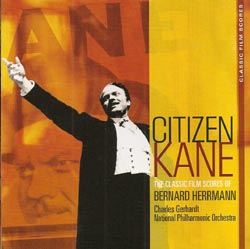
In another particularly captivating segment of the documentary, film critic Leonard Maltin discusses the lasting influence and significance of Herrmann’s initial foray into the highly competitive world of film scoring. It was the landmark music for Orson Welles’ masterpiece, CITIZEN KANE. While soprano Kiri Te Kanawa sings the famed aria from the SALAMMBO sequence in the film, Ted Gilling recalls that her recording for the
RCA Classic Film Scores Series, conducted by Charles Gerhardt, was sung perfectly. In the film, however, Herrmann deliberately scored the notes too high so that a less competent singer might be perceived as incompetent.
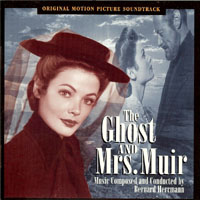
Craig Reardon brings quiet pathos to the program when he gently debunks the composer’s renowned cynicism, recalling that Herrmann’s own favorite score was his work for
THE GHOST AND MRS. MUIR. Perhaps the most deeply personal, achingly sensitive score of his career, Herrmann remembers his music as reflecting “more of me than any other film score.” Herrmann biographer Steven C. Smith remarks rather tellingly that MRS. MUIR was the film that Herrmann took with him to film schools, and that Herrmann often felt isolated and alone. The exquisite beauty of this singular motion picture score laid bare the deep sensitivity that Herrmann tried so desperately to shield from the public. It was a place that the passionately reclusive composer would visit only through his music.
Herrmann would react angrily at the suggestion that had ever repeated himself, and dismissed entirely the critical revelation that he had borrowed from the scores of both JANE EYRE, and CITIZEN KANE when composing his controversial opera, WUTHERING HEIGHTS. His biographer disagrees, stating that excerpts from both of Herrmann’s scores for those classic films can clearly be heard within the structure of the opera.
Composer Fred Steiner wisely comments on the fabled Hitchcock/Herrmann collaborations, stating that Herrmann’s musical palette seamlessly framed Hitchcock’s visual inspiration, as inseparably as did Max Steiner’s historic scoring of KING KONG. Fred Steiner remembers with mischievous glee a delicious observation by composer Lyn Murray that, after composing the music for TO CATCH A THIEF, the worst mistake he ever made was in introducing Alfred Hitchcock to Bernard Herrmann. It effectively ended his own brief collaboration with the famed director.
While imitation has often been considered the sincerest form of flattery, writer Paul Mandell vehemently discusses his indignation over Richard Band’s virtual creative theft of Herrmann’s PSYCHO score in THE REANIMATOR. In a one hour profile focusing on the successful on screen collaboration between Steven Spielberg and John Williams for Turner Classic Movies, Spielberg recalls that his own association with Maestro Williams was not dissimilar from the legendary films pairing Alfred Hitchcock with Bernard Herrmann. For that remarkable televised conversation, Spielberg remembers receiving a call from Martin Scorsese asking if he would like to come down to the recording studio to meet Bernard Herrmann. With a mischievous twinkle in his eye, Spielberg joyfully recounts how he professed his love of Herrmann’s music to the cynical composer…to which Herrmann replied “Yea, well if you like my music so much, how come you always use Williams?” As a poignant coda to that remembrance, Spielberg concludes by remembering that Bernard Herrmann passed away that very night.
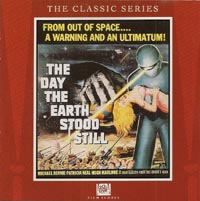 The documentary lovingly addresses each period of Bernard Herrmann’s career with equal and lavish illustration. Bruce Crawford recalls that it was the composer’s friend, Alfred Newman, who ushered in the modern sound of science fiction and fantasy at 20th Century Fox by offering Herrmann the chance to score the Robert Wise classic, THE DAY THE EARTH STOOD STILL, as well as Jules Verne’s JOURNEY TO THE CENTER OF THE EARTH. Never before had such other worldly realms and destinations been represented with such profoundly conceptual dramatic scoring. Norma Shephard, Herrmann’s third wife, recalls that French director Francois Truffaut particularly desired a fantastic score for his version of Ray Bradbury’s visionary science fiction classic, FAHRENHEIT 451. A seminal novel of futuristic, repressive societal censorship, Bradbury’s Orwellian tale had struck a nerve during the post war years. As related by Shephard, Truffaut told Herrmann that “any composer can give me the music of the twentieth century, but YOU can give me the music of the twenty third century.” Musical interludes from Herrmann’s exquisite score for FAHRENHEIT 451 follow, along with a sublimely magical excerpt from the composer’s scoring of Rod Serling’s THE TWILIGHT ZONE.
The documentary lovingly addresses each period of Bernard Herrmann’s career with equal and lavish illustration. Bruce Crawford recalls that it was the composer’s friend, Alfred Newman, who ushered in the modern sound of science fiction and fantasy at 20th Century Fox by offering Herrmann the chance to score the Robert Wise classic, THE DAY THE EARTH STOOD STILL, as well as Jules Verne’s JOURNEY TO THE CENTER OF THE EARTH. Never before had such other worldly realms and destinations been represented with such profoundly conceptual dramatic scoring. Norma Shephard, Herrmann’s third wife, recalls that French director Francois Truffaut particularly desired a fantastic score for his version of Ray Bradbury’s visionary science fiction classic, FAHRENHEIT 451. A seminal novel of futuristic, repressive societal censorship, Bradbury’s Orwellian tale had struck a nerve during the post war years. As related by Shephard, Truffaut told Herrmann that “any composer can give me the music of the twentieth century, but YOU can give me the music of the twenty third century.” Musical interludes from Herrmann’s exquisite score for FAHRENHEIT 451 follow, along with a sublimely magical excerpt from the composer’s scoring of Rod Serling’s THE TWILIGHT ZONE.
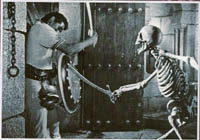 Ray Harryhausen, fantasy cinema’s late, beloved special effects genius, discusses the music for their first collaboration, THE 7TH VOYAGE OF SINBAD, recalling that his longtime producer, Charles Schneer, had known Herrmann, and had asked him to score the picture for them. While the composer’s memorable accompaniment for the skeleton fight plays hauntingly in the background, Harryhausen remarks that “His style of music was so appropriate for our pictures. He did four scores for us (THE 7TH VOYAGE OF SINBAD),THE 3 WORLDS OF GULLIVER, MYSTERIOUS ISLAND, and JASON AND THE ARGONAUTS), and all four were wonderful scores.”
Ray Harryhausen, fantasy cinema’s late, beloved special effects genius, discusses the music for their first collaboration, THE 7TH VOYAGE OF SINBAD, recalling that his longtime producer, Charles Schneer, had known Herrmann, and had asked him to score the picture for them. While the composer’s memorable accompaniment for the skeleton fight plays hauntingly in the background, Harryhausen remarks that “His style of music was so appropriate for our pictures. He did four scores for us (THE 7TH VOYAGE OF SINBAD),THE 3 WORLDS OF GULLIVER, MYSTERIOUS ISLAND, and JASON AND THE ARGONAUTS), and all four were wonderful scores.”
Film editor Paul Hirsch (SISTERS) used Herrmann’s score for Hitchcock’s PSYCHO as a “temp track” in an effort to interest potential investors in the subsequent Brian De Palma film. Later, the director flew Herrmann to London to score the picture, recalling that the great composer appeared disheveled when they met. For De Palma’s personal masterpiece, OBSESSION, the director joined Herrmann at the MGM screening room in New York. Herrmann had worked feverishly to complete the music, and remarked that he had become so obsessed with the picture that he actually retained no memory of having written the score. At the conclusion of the screening of the completed film, Paul Hirsch turned to the composer and said “Benny, it was a beautiful score.” For Herrmann’s part, he was so emotionally overpowered and drained by the film and its music that he wept unashamedly for ten minutes. Turning to Hirsch, he said “I don’t remember writing it.” He could only remember working in the middle of the night, and feeling that “this music needs women’s voices.” Hirsch felt that, perhaps, Herrmann had, indeed, “heard the angels calling him.” The composer’s exquisite score for OBSESSION is quintessential Herrmann, an eloquent salutation to his embattled career and ultimate legacy. If, as Hirsch remembers, Herrmann had “heard the angels calling him,” then he sang back to them spiritually, majestically, with his own, deeply inspired spectral voices. It would become his infinitely ethereal musical soliloquy.

Bernard Herrmann had previously suffered a heart attack in 1974. Ted Gilling comments that Herrmann “must have known that his time was near, and kept pushing to get his score for TAXI DRIVER done.” During a dinner break after completing his music for the Scorsese picture, Herrmann signed an autograph for two young boys, writing out the first three measures of his score for PSYCHO, and signing their book. He was joined by Paul Hirsch and “Taffy,” his daughter Dorothy Herrmann. Ruth Herrmann, his brother Louie’s wife, remembers “Benny” looking remarkably aged, and walking with a cane.” Escorting her brother-in-law to the airport, he seemed in a particularly foul mood. She remembers asking “Benny” and Louie to mend their brotherly differences, kiss, and make up. Herrmann died of a massive coronary at age 64, after “wrapping” his part in the musical scoring of TAXI DRIVER, on Christmas Eve, 1975.
Ray Harryhausen concludes the remarkable broadcast observing, somewhat poignantly, that Bernard Herrmann “despite his gruff exterior was really a wonderful man.” The end title music for TAXI DRIVER brings the documentary full circle and to its finish, noting that the final screen credit in the Martin Scorsese noir classic reads…”Dedicated To The Memory Of Bernard Herrmann.” Bernard Herrmann was a profoundly passionate, sensitive soul whose musical fire emblazoned the screen with a singularly radiant eternal flame. The smoldering embers of his brilliance have sparked, inspired, and enriched this superlative documentary.
--Steve Vertlieb, 26 April 2014
Edited by Roger Hall
The two-and-a-half hour radio documentary by Bruce Crawford and Bob Coate was broadcast on KIOS-FM in 1988.
Outline of the documentary:
Part I
MUSIC |
Psycho: Prelude and Murder;
The Devil and Daniel Webster;
Taxi Driver: Theme |
|
Introduction by Bruce Crawford |
INTERVIEW |
Clark Harrington about meeting Herrmann |
INTERVIEW |
Lucille Fletcher about meeting Herrmann |
INTERVIEW |
Norman Corwin |
INTERVIEW |
Lucille Fletcher about The Hitchhiker |
BROADCAST |
Segments from The Hitchhiker |
|
Bob Coate about concert music |
MUSIC |
The Fantasticks: Month of May |
INTERVIEW |
Clark Harrington about Moby Dick |
MUSIC |
Moby Dick: The Whaleman’s Chappel (and more) |
INTERVIEW |
Clark Harrington about the Symphony |
INTERVIEW |
Lucille Fletcher about Herrmann composing the Symphony |
MUSIC |
Symphony: Finale |
Part II
|
Crawford about film music |
INTERVIEW |
Leonard Maltin about film music and Citizen Kane |
MUSIC |
Citizen Kane: “Overture” |
INTERVIEW |
Ted Gilling about the “Salaambo Aria” from Citizen Kane |
MUSIC |
Citizen Kane: Salaambo Aria, Rosebud and Finale |
INTERVIEW |
Louis Kaufman |
MUSIC |
The Devil and Daniel Webster: Finale |
INTERVIEW |
Louis Kaufman about Herrmann’s personality |
|
Crawford about Herrmann’s romantic period |
MUSIC |
Hangover Square: Concerto Macabre (excerpts) |
INTERVIEW |
Craig Reardon about The Ghost and Mrs. Muir |
MUSIC |
The Ghost and Mrs. Muir (excerpts) |
INTERVIEW |
Steven C. Smith about The Ghost and Mrs. Muir and Wuthering Heights |
INTERVIEW |
Louis and Annette Kaufman about Wuthering Heights |
MUSIC |
Wuthering Heights (excerpts) |
|
Coate about the Herrmann/Hitchcock collaborations |
INTERVIEW |
Leonard Maltin about Vertigo |
INTERVIEW |
Fred Steiner about Herrmann’s music for Hitchcock |
MUSIC |
Vertigo: Prelude and Rooftop |
INTERVIEW |
Leonard Maltin about North by Northwest |
MUSIC |
North by Northwest: Overture |
INTERVIEW |
Fred Steiner about Lyn Murray |
INTERVIEW |
Paul Mandell about Psycho |
INTERVIEW |
Fred Steiner about demonic music |
INTERVIEW |
Leonard Maltin about Psycho |
MUSIC |
Psycho (excerpts) |
|
Coate about the Herrmann/Hitchcock break-up |
INTERVIEW |
David Raksin about Torn Curtain |
MUSIC |
Torn Curtain: Prelude |
Part III
|
Coate introducing sci-fi scores |
INTERVIEW |
Ted Gilling about Journey to the Center of the Earth |
MUSIC |
Journey to the Center of the Earth: Prelude |
INTERVIEW |
Leonard Maltin about The Day the Earth Stood Still |
MUSIC |
The Day the Earth Stood Still: Outer Space (prelude) |
INTERVIEW |
Norma Shepherd about Fahrenheit 451 |
MUSIC |
Fahrenheit 451: Prelude and Fire Engine |
|
Coate about television and The Twilight Zone |
MUSIC |
The Twilight Zone: End Theme |
|
Crawford introducing Harryhausen |
INTERVIEW |
Ray Harryhausen about The 7th Voyage of Sinbad |
INTERVIEW |
Leonard Maltin about The 7th Voyage of Sinbad |
MUSIC |
The 7th Voyage of Sinbad: Duel with the Skeleton |
INTERVIEW |
Paul Mandell about Mysterious Island |
INTERVIEW |
Ray Harryhausen about Herrmann’s music |
MUSIC |
Mysterious Island: Prelude |
|
Crawford about Herrmann moving to England |
INTERVIEW |
Paul Hirsh about Sisters |
MUSIC |
Sisters: Prelude |
INTERVIEW |
Paul Hirsh about first screening of Obsession |
MUSIC |
Obsession: Prelude |
|
Crawford introducing Taxi Driver |
INTERVIEW |
Ted Gilling about Taxi Driver |
INTERVIEW |
Paul Hirsh about dinner with Herrmann |
MUSIC |
Taxi Driver: Theme |
INTERVIEW |
Paul Mandell about Taxi Driver |
INTERVIEW |
Leonard Maltin about Taxi Driver |
INTERVIEW |
Ruth Herrmann about last meeting |
|
Crawford about December 24, 1975 |
INTERVIEW |
Leonard Maltin about Herrmann |
INTERVIEW |
Ray Harryhausen about Herrmann |
|
Bob Coate closing |
|
Bruce Crawford closing |
MUSIC |
Taxi Driver: End Credits |
MUSIC |
Citizen Kane: Theme and Variations with program credits
|
© 2014 (Updated: 2023).
This entire article is not to be copied without permission.
For permission to reprint this article -- click here
© 2014 (Updated: 2023) This website is copyrighted by PineTree Productions. All Rights Reserved for any original material on this website.
More about the film composer...
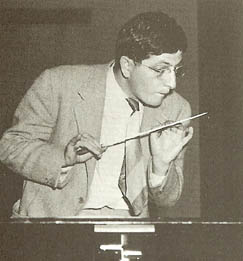
Bernard Herrmann's "Walking Distance"
"OBSESSION"- A Tribute to
Bernard Herrmann

Film Music Review (Home page)
